Sunday Feb 22, 2026
Sunday Feb 22, 2026
Thursday, 26 November 2020 02:58 - - {{hitsCtrl.values.hits}}

From left: SC Securities Head of Research Charitha Gunasekere, 99X Technology CEO Mano Sekaram, Expolanka Holdings Group CEO Hanif Yusoof, Hemas Holdings Group CEO Kasturi Wilson, John Keells Holdings Chairman Krishan Balendra, Hayleys Co-Chairman Dhammika Perera, Moderator Daily FT Editor/CEO Nisthar Cassim, State Minister of Money and Capital Market and State Enterprise Reforms Ajith Nivard Cabraal, Secretary to the Treasury and Ministry of Finance S.R. Attygalle, Access Engineering Chairman Sumal Perera, Standard Chartered Bank Sri Lanka CEO Bingumal Thewarathanthri, PricewaterhouseCoopers Director Charmaine Tillekeratne and University of Colombo MBA Alumni Association President Ranga Ratnayake at the Daily FT-Colombo University MBA Alumni 2021 Budget Forum
By Uditha Jayasinghe
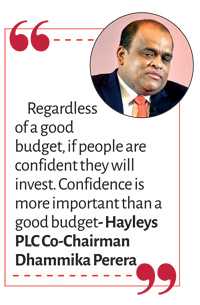 |
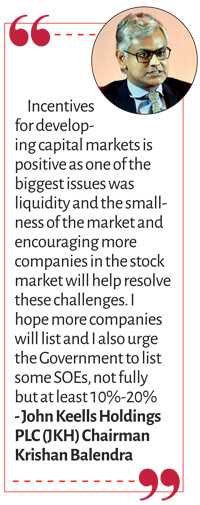 |
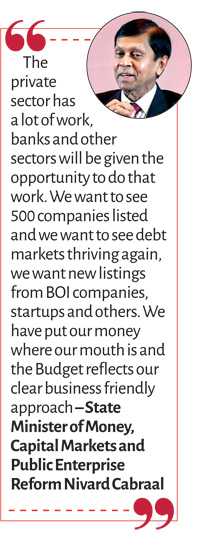 |
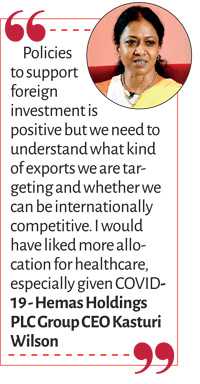 |
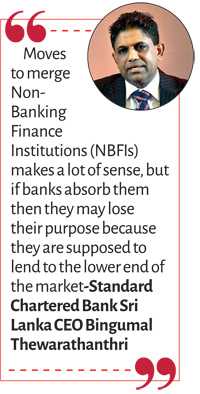 |
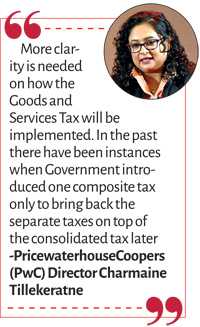 |
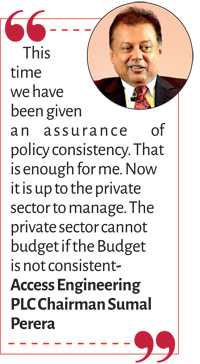 |
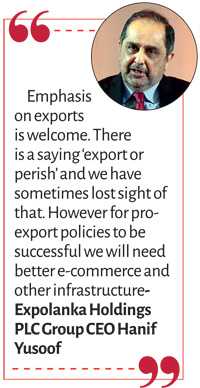 |
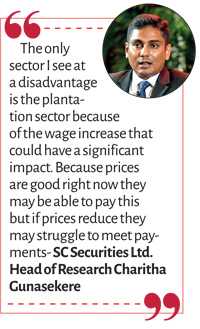 |
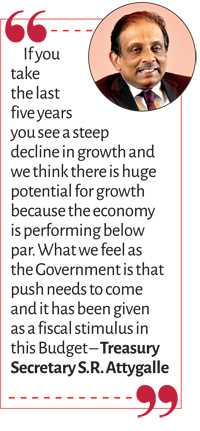 |
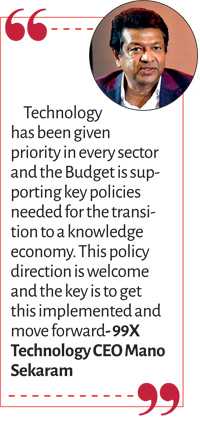 |
Dissecting Budget 2021, prominent private sector leaders last week praised the key policy document for setting policy consistency, while public sector officials said it encompassed the business-friendly outlook of the Government and embedded stability, inclusivity and consistency in its myriad proposals.
Speaking at the Daily FT-Colombo University MBA Alumni Association organised Budget 2021 Forum, State Minister of Money, Capital Markets and Public Enterprise Reform Nivard Cabraal emphasised that the bedrock of the document was stability, which had been assured through political stability as well as the pledge to have no significant tax changes for the next five years.
“The key policy document anchors growth as the foundation of Sri Lanka’s future development,” he said.
Representing the private sector was Hayleys PLC Co-Chairman Dhammika Perera, John Keells Holdings PLC (JKH) Chairman Krishan Balendra, Access Engineering PLC Chairman Sumal Perera, Hemas Holdings PLC Group CEO Kasturi Wilson, Expolanka Holdings PLC Group CEO Hanif Yusoof, Standard Chartered Bank Sri Lanka CEO Bingumal Thewarathanthri, 99X Technology CEO Mano Sekaram, PricewaterhouseCoopers (PwC) Director Charmaine Tillekeratne and SC Securities Ltd. Head of Research Charitha Gunasekere, who were all broadly supportive of the Budget.
Anchoring growth
State Minister Cabraal also said the focus of the Government would remain on ensuring a stable rupee and interest rates to assist the private sector to expand in a turbulence free environment despite the challenges posed by COVID-19.
“Firstly we needed a stable Government and we needed to talk in one voice. Today we have consistent policies and we have long-term plans that have been conveyed. We are all singing from the same hymn book. We are aware that we need to have sound strong macro fundamentals, if not they will have impact on business. We will ensure there will be a stable rupee and stable interest rates.”
Referring to a recent criticism by European Union (EU) Ambassadors on import restrictions imposed by the Government in April, Cabraal insisted that it was a prudent move taken to ensure macroeconomic stability and debt repayment capacity. He also said Sri Lanka should not be judged for taking steps it deemed necessary and disclosed that the import restrictions would eventually be adjusted, possibly sometime next year.
“The extraordinary step we took in curtailing imports was because it was necessary, otherwise we may have seen a rupee that was Rs. 250 to the dollar. Each country has to cut their cloth according to their growth. When I met these EU Ambassadors I explained our situation and asked ‘would you want us to default on our debt or do you want us to manage our imports?’ We took the responsible decision and people need to respect that. We are suffering because tourists are not coming from some of these countries but can we say ‘send tourists’?
“The Trade Minister and I are assessing how import restrictions can be rolled back and we will see how that can be managed in the future. We want people to understand that this is a partnership of different stakeholders.”
Inclusivity as a Budget goal
He also reiterated that inclusivity was a central goal of the Budget, backing continued infrastructure development. The State Minister noted that providing access to services including drinking water was a deliverable that President Gotabaya Rajapaksa wanted to achieve during his term and the Budget mirrored some of those intentions.
“An investment of $ 1 b will be coming into the Port City and this will provide fresh impetus. On Thursday we saw the signing for investment of a tyre factory and even though it’s only one investment it will take up 30% of the earmarked investment land. So with the policies that we have set in place we are confident we will attract investment and this will anchor growth. There is no other shortcut. If we have investment gradually coming in then there will be growth.”
The private sector will be expected to make the most of the enabling environment created by the Budget, Cabraal said, as the Government is keen to see 500 companies listed by 2025 and greater involvement of banks in investment activities.
“The private sector has a lot of work, banks and other sectors will be given the opportunity to do that work. We want to see 500 companies listed and we want to see debt markets thriving again, we want new listings from BOI companies, startups and others. We have put our money where our mouth is and the Budget reflects our clear business-friendly approach.”
Treasury Secretary S.R. Attygalle responding to questions during the panel discussion focused on the potential of the Sri Lankan economy, which has been struggling with slow growth to expand swiftly in 2021.
He also defended tax changes in the Budget, particularly levying 0.25% of turnover on selected industries to establish a COVID-19 insurance fund. He pointed out that given the decision of the Government refrain from imposing taxes and reduce existing rates the insurance levy should not be considered a major burden.
Economic performance below par
“If you take the last five years you see a steep decline in growth and we think there is huge potential for growth because the economy is performing below par. What we feel as the Government is that push needs to come and it has been given as a fiscal stimulus in this Budget.”
He acknowledged that capital investment would have to be balanced with investment and stressed that many of the projects earmarked by the Government depended on local funds or low interest funds from the Asian Development Bank and World Bank.
“We will not embark on large projects other than the highways we have identified. The focus is mostly on SMEs and bringing them up is bringing up the economy.”
Difficult job, well done
The top business leaders speaking in their turn welcomed Budget 2021 and commended the Government for employing a light touch with taxes while encouraging investment in several key sectors but also called for strong implementation and more policies to underpin the proposals.
They nonetheless acknowledged that the Government had a challenging road ahead to ensure implementation of all the proposals and also advocated for more engagement on a handful of proposals including the mandated plantation wage, change in retirement age and 0.25% insurance levy on turnover of companies in some sectors.
“The biggest highlight is tax rates will be kept for five years and the thrust for exports is welcome. We have had many decades of trade deficits and if you look at successful Asian economies they were all driven by exports and support for them is positive. Working on stronger trade relationships is also good.”
“Incentives for developing capital markets is positive as one of the biggest issues was liquidity and the smallness of the market and encouraging more companies in the stock market will help resolve these challenges. I hope more companies will list and I also urge the Government to list some State Owned Enterprise (SOEs), not fully but at least 10%-20%. Overall I want to compliment the Government on a business friendly Budget,” JKH Chairman Balendra said.
His views were echoed by the other panellists.
“This time we have been given an assurance of policy consistency. That is enough for me. Now it is up to the private sector to manage. The private sector cannot budget if the Budget is not consistent. The overall economy takes precedence over any industry and as you know over the last few decades we have lived beyond our means and now difficult decisions have to be made to put the economy back on track. This Budget has been based on economic principles, not accounting, which should be the way. I hope the private sector and the rest of the stakeholders support it. We will all have different opinions. I think business must be left up to the private sector and an enabling environment should be set up by government. This latest Budget is a difficult job well done,” said Access Engineering PLC Chairman Sumal Perera.
Hayleys PLC Co-Chairman Dhammika Perera pointed out that inspiring confidence in investors was more than half the battle as sentiment was at least as important as Government plans and fundamentals. He pointed out how investors were flocking to the stock market well before the Budget presentation on 17 November and was likely to continue as long as market confidence remained high.
“Regardless of a good budget, if people are confident they will invest. Confidence is more important than a good budget. Overall the Budget is positive and even though people are worried about reserves given Sri Lanka’s debt repayments next year, I’m confident we will be alright as there are corresponding savings in reduction of imports and fuel. Despite COVID-19 the macroeconomic situation can be managed.”
Focus on healthcare, tech, exports
Hemas Holdings PLC Group CEO Kasturi Wilson was also positive of the Budget’s focus on growth over taxes but opined that more focus on healthcare would have been welcome given the challenges posed by COVID-19. She also backed adjusting Budget allocations so sectors such as public welfare, education and healthcare get larger contributions.
“The Budget could have gone two ways, one was to tighten our belts and have ad hoc taxes but there appears to be a focus on stability, which is welcome. Policies to support foreign investment is positive but we need to understand what kind of exports we are targeting and whether we can be internationally competitive. I would have liked more allocation for healthcare, especially given COVID-19. We are doing more on defence and public safety but health needs more focus as well.”
Expolanka Holdings PLC Group CEO Hanif Yusoof said, “Emphasis on exports is welcome. There is a saying ‘export or perish’ and we have sometimes lost sight of that. However for pro-export policies to be successful we will need better e-commerce and other infrastructure. More implementation focus on the Budget would also be welcome, especially on the long-sought-after single window for exports. We need to seriously reform public sector institutions if we are serious about becoming a hub serving all south Asia.”
99X Technology CEO Mano Sekaram called on the Government to have consistency to assist the private sector and spoke positively of Budget support for the tech sector to boost exports in agriculture and other categories. He also emphasised the need to bridge the productivity divide between rural and urban areas by utilising technology.
“Technology has been given priority in every sector and the Budget is supporting key policies needed for the transition to a knowledge economy. This policy direction is welcome and the key is to get this implemented and move forward.”
Standard Chartered Bank Sri Lanka CEO Bingumal Thewarathanthri focused on the macroeconomic outlook for Sri Lanka next year and noted that the Government’s aim of relying on domestic finance for most projects was unlikely to crowd out the private sector as there was sufficient liquidity.
“Sri Lanka has to make the shift from a debt driven economy to an investment economy. Moves to merge Non-Banking Finance Institutions (NBFIs) makes a lot of sense, but if banks absorb them then they may lose their purpose because they are supposed to lend to the lower end of the market. The Rs. 500,000 support for startups is positive but the sector may not be ready for small ticket transactions of this nature and there should be a regulatory framework to support them.”
Broadening tax base
PwC Director Charmaine Tillekeratne pointed out that the Government would have to improve tax collection and broaden the tax base to meet the ambitious revenue target and strictly monitor public finance to ensure the deficit remained contained and debt sustainability maintained.
She also called for more clarity on how the Goods and Services Tax would be implemented, recalling that while a consolidated tax was a good move there had been instances in the past where the Government had introduced one composite tax only to bring back the separate taxes on top of the consolidated tax later.
SC Securities Ltd. Head of Research Charitha Gunasekere opined that the main winners in the Budget were agri, manufacturing and exports sectors.
“The only sector I see at a disadvantage is the plantation sector because of the wage increase that could have a significant impact. Because prices are good right now they may be able to pay this but if prices reduce they may struggle to meet payments. Capital market incentives will attract investors to the bullish segments of the economy.”
Dividend divide
The forum also triggered much debate on the taxation policy on dividends as well as some of the new tax measures and incentives with some participants calling on the Government to end the exemption on dividends being tax-free to foreigners.
From 2020, January receipt of dividends by foreigners has been tax-free. However the 2021 Budget presented last week referred to a proposed exemption on tax on dividends of foreign companies for three years if such dividends are reinvested on expansion of their businesses or in the money or stock market or in Sri Lanka International Sovereign Bonds.
The 2021 Budget also proposed a reduction of tax imposed on dividend income received by multinational companies by 25% in 2021 and 50% in 2023 under the condition that they increase their exports by 30% and 50% respectively.
These two moves created uncertainty over their relevance given the prevailing blanket exemption enjoyed by non-residents on dividend income received from Sri Lanka. Some wondered whether the new proposals implied that if not adhered to, non-national dividends would be taxed.
At the Daily FT-Colombo Uni. MBAA Budget Forum, Treasury Secretary S.R. Attygalle clarified it was not going to be so foreigners would continue to enjoy tax-free dividend income. “Via these proposals we have only made a request for non-national individuals and multinational companies to reinvest in Sri Lanka and increase exports where applicable,” the Finance Ministry Secretary emphasised.
Business leader and Hayleys PLC Co-Chairman Dhammika Perera who was among the 11-member panel chipped in saying whilst foreigners were favoured, Sri Lankans were required to pay taxes ranging from 14% at corporate level on dividend income and 18% at personal income tax level.
He flagged that this was a case of “one country, two laws” and the Government should ideally be encouraging Sri Lankan companies to make profit (for which normal tax rates between a low of 14% and a high of 40% are applicable) and thereafter declare dividends and enjoy the same tax-free benefits. If the Government wanted to level the playing field, Perera suggested a lower rate of tax on dividend income for non-nationals and a reduction in tax on Sri Lankans.
Attygalle however emphasised Sri Lanka needed foreign investments, hence the concessions, given whilst a fair taxation on locals was necessary as part of boosting Government revenue.
The 2021 Budget announced tax concessions to encourage listing of companies on the Colombo Stock Exchange (CSE) may not ensure a spike in new PLCs in the country, as highlighted at the forum.
The Budget proposal was a 50% tax concession for the years 2021/2022 is provided for companies that are listed before 31 December 2021 and a concessionary corporate tax rate of 14% will be provided for the subsequent three years.
It was pointed out at the forum that apart from the benefit in the first year, the concessionary 14% rate for next three years was less attractive since at present whether listed or not, exports, tourism, education, medicare, construction, and agro processing companies anyway enjoy the lowest rate of 14% at present.
The concessionary 14% rate may appeal for manufacturing sector companies currently unlisted as they pay a higher 18% rate as well as trading, banking, finance and insurance companies who pay a 24%.
Attygalle emphasised that 50% concession on year one was significant whilst 14% rate for next three years was appealing for the manufacturing sector. However he indicated that the Government might revisit this issue and consider suggestions.
Investment in self sufficiency
Access Group will be expanding by investing in agriculture and livestock industries, Access Engineering Chairman Sumal Perera said, as part of efforts to bolster Sri Lanka’s food security.
Speaking at the forum, Perera acknowledged that many countries were refocusing on food security, following vulnerabilities created by COVID-19 and that he, too, felt that it was an important endeavour.
“Food security has become a national priority, and as responsible corporates, we must respond. We have already embarked on investing in some Mahaweli land, and we hope to invest in a livestock project with international investment. We may also consider a possible investment in fisheries,” he said.
Perera conceded there was less profit in agricultural and livestock sectors, but insisted that he considered it a “national investment” needed for Sri Lanka’s development.
FDI for dedicated zones
Sri Lanka should look to attract foreign investors for its newly-approved dedicated investment zone for pharmaceuticals in Hambantota or risk it becoming an unsuccessful attempt at import substitution, a top expert said recently.
Hemas Holdings PLC Group CEO Kasturi Wilson pointed out that even though many countries in the world were intent on increasing their self-sufficiency in pharmaceuticals, Sri Lanka would need to be more pragmatic as it lacked the internal economic scale needed to establish a supply chain for high quality raw materials, funding for costly research and development and other expertise needed for large-scale drug manufacturing.
“The dedicated zone is good but it’s not enough. We have to attract investment aimed at exports. For this we need foreign investors and we need to figure out how to attract them. Global drug manufacturing requires economies of scale and that is very hard to duplicate in a country as small as Sri Lanka. However, if we identify these problems we can find solutions. Countries such as Taiwan and Israel were very good at identifying select items and targeting them for exports. In the post-COVID-19 environment companies are looking at minimising disruptions to supply chains and we can see if we can offer them such incentives but for just local supply it will not work.”
She also said Hemas would “actively look at expanding” given the incentives provided in Budget 2021 but conceded corporates needed the right legal and regulatory frameworks and may not be sorely swayed by tax incentives.
“We also have to think about the scale you can enter at and how we can meet international levels of competitiveness. COVID-19 taught us there is space for everyone to play and conglomerates will play their role, even to support SMEs to scale up. We can align portfolios and see how we can make work in ways that will be impactful and relevant for Sri Lanka.”
Earlier this month Cabinet approved a special 200-acre investment zone for pharmaceutical manufacturing within the Arabokka estate in Hambantota, which will be open to 20 local companies. The move came after the Presidential Task Force for Economic Revival and Eradication of Poverty headed by Presidential sibling Basil Rajapaksa identified the pharmaceutical manufacturing industry as a sector that could attract Foreign Direct Investments (FDI) as well as retain precious foreign exchange.
The special pharmaceutical manufacturing zone with modern facilities will be set up within an extent of 400 acres of the Arabokka estate in Hambantota. Cabinet has also declared it as a strategic development project, paving the way for the Government to provide additional relief and encouragement for investors to step forward and invest in this pharmaceutical manufacturing zone.
In the second phase, a further 20 pharmaceutical manufacturing companies within 200 more acres will be set up. The Board of Investment (BOI) will furnish necessary infrastructure facilities to the zone.
Strategic Partner of the Forum was Standard Chartered Bank, Technical Partner PwC, Capital Markets Partner SC Securities Ltd., Creative Partner Phoenix Ogilvy and Electronic Media Partner Ada Derana 24.
Pix by Ruwan Walpola
Policymakers called on to focus on overall labour market reforms to provide flexibility to meet productivity and ageing demographic challenges
The dual policy proposals to increase the private sector retirement age to 60 and imposing a 0.25% levy on turnover of companies belonging to selected sectors to set up a COVID-19 insurance fund could have a regressive impact on the labour sector, top industry officials warned recently.
Several participants of the Daily FT-Colombo University MBA Alumni Association organised Budget 2021 Forum including Access Engineering PLC Chairman Sumal Perera, Hemas Holdings PLC Group CEO Kasturi Wilson and 99X Technology CEO Mano Sekaram were of the view that imposing a retirement age was unnecessary as most companies would keep workers past the standard retirement age of 55.
They also pointed out setting a higher retirement age would reduce space for companies to balance and manage their staff as best suited them.
“It is disappointing that Budget 2021 did not focus more on the opportunity to implement labour reform in the post-COVID environment. When a pandemic hits the first reaction is to freeze recruitment. However, in our industry because there are so graduates coming out, we have decided to take temporary graduates and asked for the law to be amended for this period but that was not forthcoming. It is important to have labour rights but it is also important to see how we can create employment during a crisis. If graduates stay at home they will stagnate, so we have to open it out and have more flexibility over the next two years. For most companies it might be a good strategy to expand their employees to deliver better services,” Sekaram opined.
His view was echoed by Perera who emphasised that a retirement age should not be compulsory and pointed out most companies would work to retain their most productive staff. He went on to say companies should be given the flexibility to incentivise productivity to bring out the best in their employees and keep them motivated.
“The focus should be on how to create more jobs so that those entering the workforce can have fresh opportunities, rather than how long people work,” he added.
The panel, which also included Hayleys PLC Co-Chairman Dhammika Perera, John Keells Holdings PLC (JKH) Chairman Krishan Balendra, Expolanka Holdings PLC Group CEO Hanif Yusoof, Standard Chartered Bank Sri Lanka CEO Bingumal Thewarathanthri, PricewaterhouseCoopers (PwC) Director Charmaine Tillekeratne and SC Securities Ltd. Head of Research Charitha Gunasekere, warned that the Government may have also taken a wrong turn in imposing a new tax to fund a COVID-19 insurance scheme.
The panellists argued that companies have already made considerable efforts to attempt retaining as many staff as possible and may step back from such measures if they are also forced to pay an additional tax. The Government is expected to funnel earnings from the new levy into a separate fund to set up an insurance scheme to support people who lost employment due to the pandemic.
Hemas Group CEO Kasturi Wilson pointed this was a dual edged policy because it disincentivised companies from focusing on retaining staff as they would have to spend more on keeping employees as well as paying the new tax. JKH Chairman Krishan Balendra also pointed out that while some companies had had to reduce staff in some subsidiaries they were hiring additional staff in others and the levy could be unfairly applied in such instances.
“Take us for example, our tourism business is doing badly so there are staff reductions on that front but we are also hiring more staff into other segments such as supermarkets to widen services. So the new proposal will have to be sensitive to complex situations created by COVID-19.”